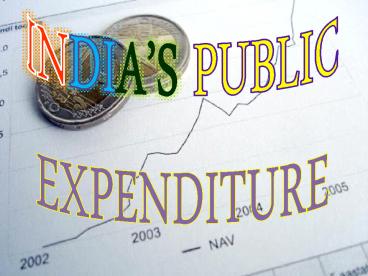Introduction to public expenditure - PowerPoint PPT Presentation
Title:
Introduction to public expenditure
Description:
Public Expenditure – PowerPoint PPT presentation
Number of Views:2229
Title: Introduction to public expenditure
1
INDIAS PUBLIC EXPENDITURE
2
INTRODUCTION
The Expenditure incurred by Public authorities
like Central, State and local governments to
satisfy the collective social wants of the people
is known as public expenditure.
3
OBJECTIVES OF PUBLIC EXPENDITURE
The major objectives of public expenditure
are 1) Administration of law and order and
justice. 2) Maintenance of police
force. 3) Maintenance of army and provision for
defence goods. 4) Maintenance of
diplomats in foreign countries. 5)
Public Administration
4
6) Servicing of public debt. 7) Development
of industries. 8) Development of transport
and communication. 9) Provision for public
health. 10) Creation of social goods.
5
NEED/IMPORTANCE/SIGNIFICANCE OF PUBLIC
EXPENDITURE
1. To promote rapid economic
development 2. To promote trade and
commerce 3. To promote rural development 4. To
promote balanced regional growth 5. To
develop agricultural and industrial
sectors
6
6. To build socio-economic overheads eg.
roadways, railways, power etc. 7. To exploit and
develop mineral resources like coal and
oil. 8. To provide collective wants and
maximise social welfare. 9. To promote full -
employment and maintain price
stability. 10. To ensure an equitable
distribution of income
7
CLASSIFICATION OF PUBLIC EXPENDITURE
8
1) Capital And Revenue Expenditure-
Capital Expenditure of the government
refers to that expenditure which results
in creation of fixed assets. Revenue
expenditures are current or consumption
expenditures incurred on civil
administration,defence forces, public health
and,education,maintenance of government
machinery etc.
9
(No Transcript)
10
2) Development And Non - Developmental
Expenditure /Productive And
Non-Productive Expenditure -
All expenditures that promote economic growth
development are termed as development
expenditure. Unproductive (non - development)
expenditure refers to those expenditures which do
not yield any income
11
3) Transfer And Non-Transfer Expenditure-
Transfer expenditure refers to those kind of
expenditures against there is no corresponding
transfer of real resources i.e., goods or
services. The non - transfer expenditure relates
to that expenditure which results in creation of
income or output The non - transfer expenditure
includes development as well as non - development
expenditure.
12
4) PLAN AND NON-PLAN EXPENDITURE
The plan expenditure is incurred on development
activities outlined in ongoing five year
plan. The non - plan expenditure is incurred on
those activities, which are not included in
five-year plan.
13
Other Classification (Mrs. Hicks)
14
Mrs. Hicks classified Public Expenditure on the
basis of duties of government. It is as follows
- a) Defence Expenditure - It is expenditure
on defence equipments, wages and salaries of
armed forces, navy and airforce etc. b) Civil
Expenditure - Government/incurs this expenditure
to maintain law and order and administration of
justice. c) Development Expenditure - It is
expenditure on development of agriculture,
industry, trade and commerce, transport and
communication etc.
15
CAUSES OF INCREASE IN PUBLIC EXPENDITURE IN INDIA
1) Growing Population 2) Defence
Expenditure 3) Interest Payments
4) Subsidies 5) Administration 6) Rise In
National Income 7) Urbanisation 8) Rural
Development 9) Inflation
16
10) Democratic Government 11) Social Security
Measures 12) Growth Of Transport And
Communication 13) Development Of Agriculture
15) Poverty Alleviation Programmes
16) Research And Development 17) Economic
Planning
17
IS PUBLIC EXPENDITURE GOOD FOR AN ECONOMY???
1) Public Expenditure must be productive
and used for developmental purposes. 2) A proper
authority should give the approval of
public expenditure. 3) Auditing of public
expenditure should be done to ensure that
money is spent for the purpose for which it
is sanctioned.
18
4) Public Expenditure should be incurred
on essential items of common benefit. 5) Public
expenditure should promote flexibility
and changes in spending policy of the
state. 6) There should be flexibility and
changes in spending policy of the
state. Thus, the spending policy
of the government must give benefits to
the society as a whole.
19
(No Transcript)































